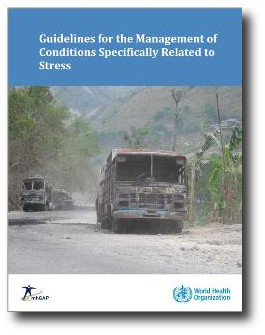In response to numerous requests from health care providers, the World Health Organization (WHO) recently released new clinical protocols and guidelines on treating the mental health consequences of trauma and loss.  The new protocol, co-published with the United Nations High Commissioner for Refugees (UNHCR), enables primary healthcare workers to offer basic psychological support to refugees as well as people exposed to trauma or loss in other situations. It was developed in response to the fact that agencies working in post conflict and natural disaster settings are becoming increasingly interested in mental health care.
The new protocol, co-published with the United Nations High Commissioner for Refugees (UNHCR), enables primary healthcare workers to offer basic psychological support to refugees as well as people exposed to trauma or loss in other situations. It was developed in response to the fact that agencies working in post conflict and natural disaster settings are becoming increasingly interested in mental health care.
In a previous WHO study of 21 countries, respondents reported witnessing violence or experiencing interpersonal violence, accidents, exposure to war or trauma to a loved one. An estimated 3.6% of the world’s population has suffered from post-traumatic stress disorder (PTSD) in the previous year, the study showed.
“Primary health-care providers will now be able to offer basic support consistent with the best available evidence,” said Dr. Oleg Chestnov, WHO Assistant Director-General for Noncommunicable Diseases and Mental Health. “They will also learn when to refer to more advanced treatment.”
The guidelines focus on management strategies for symptoms of acute stress in the first month after a potentially traumatic event, as well as post traumatic stress disorder and bereavement.
Read more about WHO’s new guidelines.